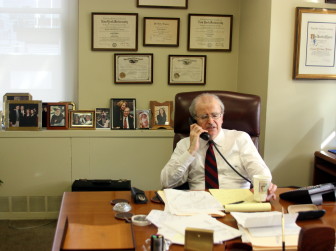
Christine Streich / JJIE
Judge Jonathan Lippman takes a phone call in his New York office.
NEW YORK — The state’s most powerful judge is a busy man. As the Chief Judge of the New York State Court of Appeals, Jonathan Lippman is not only the top jurist on almost 300 cases a year, he’s also in charge of the court’s day-day-administration.
“I always joke that I spend 100 percent of my time on my adjudicating role and I spend 100 percent of my time in my administrative role,” he said. “So there’s not a hell of a lot of time for other things.”
Still, the 69-year-old has found time to make juvenile justice reform in New York state a priority. During his tenure, Lippman has embraced the notion that youthful offenders are different — and have different needs — than their adult counterparts. He’s catalyzed legislative discussion around raising the age of criminal responsibility in New York.
 He’s also used his role as the chief judge to promote alternatives to incarceration and backed the creation of nine pilot community courts, called Adolescent Diversion Courts. Not quite family courts, not quite criminal courts, Lippman describes them as “problem solving courts” overseen by judges who have received special training for trying non-violent youthful offenders and can connect the teens with services and programs outside of incarceration.
He’s also used his role as the chief judge to promote alternatives to incarceration and backed the creation of nine pilot community courts, called Adolescent Diversion Courts. Not quite family courts, not quite criminal courts, Lippman describes them as “problem solving courts” overseen by judges who have received special training for trying non-violent youthful offenders and can connect the teens with services and programs outside of incarceration.
A native New Yorker, Lippman grew up on the Lower East Side, in a time when “it was a different place, less gentrified.” The second youngest of four sons, his mother was a teacher and his father was a businessman who was very active in co-op housing.
Today, he still brags about living in Manhattan and availing himself of all of the cultural perks that the city has to offer — including the occasional Yankees game and Broadway musical. At the time of this interview he had just seen “Once” on Broadway with his wife, Amy.
He describes his upbringing in the city as “a good growing up experience full of basketball, baseball, and all the things that kids do.” He attended New York City public schools and graduated from the prestigious Stuyvesant High School.
For Lippman, the rise to chief judge came after what he calls, “a very long apprenticeship.” He says that he had a natural affinity for the social sciences, and always pictured himself in a legal or political role, even from an early age. He attended New York University Law School and started his career as a court attorney. He is perhaps best known by his colleagues in the law for his tenure as the Chief Administrative Judge of all New York State Courts under former Chief Judge Judith Kaye.
Lippman’s colleagues say they admire his ability to call upon his diverse legal experiences.
“He’s a product of the system, spent the bulk of his career within the court system. He knows how this works in his bones and in his DNA,” said Center for Court Innovation Director Greg Berman. “He’s the chief of billions of dollars and employees, and a ton crosses his desk, but he knows my issues better than I do.”
With more than four decades of legal experience, Lippman says his support for juvenile justice reform grew naturally out of his day to day experiences as an attorney, an administrator and, of course, a judge.
“I’ve had the rare opportunity to be someone who sees the big picture of all of these different policy related issues from an operational point of view, and then being a judge who has dealt with all these different cases and seen the individual injustice, that, in my mind, often takes place,” Lippman said. “Each case tugs at your heart and makes you think twice about not only that individual case but our policy in relation to children and adult criminals.”
But he said it was raising his own now-grown kids that set the foundation for his belief that the legal system should treat children differently than adults.
“Children do things that make you want to pull your hair out,” he said. “I think that really comes home to you when you’ve raised children and you’ve seen them do silly immature things that don’t have them end up in front of the juvenile or criminal justice system.”
Observers say Lippman is not soft on crime. He believes that offenders should be punished for their crimes, just in a manner that is proportionate.
“He’s also said, which I think is very smart, that kids cannot get off scott free — they’ve got to be held accountable for their acts,” said Richard Aborn of the Citizen’s Crime Commission. “Which means we’ll give them the opportunity to reform themselves but if they don’t take advantage of that then there are more onerous consequences.”
Lippman said the “kids will be kids” outlook often fits because the vast majority of cases where 16- and 17-year-olds are tried as adults involve minor offenses.
“But when they finish with the juvenile justice system or, worse, the criminal justice system, then they’re no longer minor people who have done silly things. They’re adult criminals,” he said.
Lippman said he views juvenile justice reform as a way of leveling the playing field — a duty he ascribes to the the chief judge. He cited scientific research — which, he pointed out is backed by the U.S. Supreme Court — concluding that adolescent brains are not fully developed, so teens can lack impulse control or anger management skills. To Lippman, trying teens as adults or universally incarcerating them despite this knowledge is not unlike denying someone a defense attorney.
 “Any prosecutor will say that if you don’t have capable defense attorneys the system is unbalanced and the scales of justice are imbalanced. And I’m in the equal justice business, Lippmann said. “So whether it’s criminal justice or juvenile justice, that’s what I’m concerned about — evening the scales of justice.”
“Any prosecutor will say that if you don’t have capable defense attorneys the system is unbalanced and the scales of justice are imbalanced. And I’m in the equal justice business, Lippmann said. “So whether it’s criminal justice or juvenile justice, that’s what I’m concerned about — evening the scales of justice.”
He’s also astutely aware of the impact he can have within the parameters of his role as chief judge.
“To me it’s a rare opportunity, a singular job,” he said. “You have a pulpit from which you can have an impact on society, on the justice system, on individuals.
This approach has gained the judge many allies within and outside of New York’s criminal justice system, many of whom cite Lippman as the voice that brought many of these reform efforts like the Raise the Age movement to the foreground.
“He really put the issue on the map in my mind,” said Richard Aborn, president of the Citizen’s Crime Commission of New York City, recalling a speech Lippman gave on the topic at one of the organization’s breakfast meetings.
“He’s a constant advocate on the issue and does whatever he or his office can to support legislative efforts,” Aborn said.
But colleagues attribute more than advocacy to Lippman; they see him as a man who finds ways to make his ideas come to life. The Center for Court Innovation’s Greg Berman said that Lippman understands the laborious political process and the barriers to raising the age of criminal responsibility or even changing where youthful offenders are tried.
So while he waits for the State Assembly to change the laws, Lippman found it within his power to use money from the judicial budget to fund those nine pilot Adolescent Diversion Courts.
“I find it impressive, for him to use his bully pulpit, and articulating his view of good government, he used his administrative powers to put money where his mouth is,” Berman said.
Richard Aborn of The Citizen’s Crime Commission of New York City agrees.
“A lot of people bring ideas to the table, very few people bring money,” Aborn said.
Since Lippman’s speech at the Crime Commission breakfast and the creation of the nine pilot courts, Gov. Andrew Cuomo has articulated his own support for juvenile justice reform. He addressed the Raise The Age movement in his 2014 State of the State speech, and recently created the Commission on Youth, Public Safety & Justice and tasked it with providing “concrete, actionable recommendations regarding youth in New York's criminal and juvenile justice systems by the end of this calendar year.”
And it may be just in time.
Lippman’s tenure is winding down — he will turn 70 next May — and the law dictates that he must retire. He said he is confident that he will see at least one of his juvenile justice goals realized before he retires.
“The major thing that I want, and I want it now, is that we raise the age of criminal responsibility to 18,” Lippmann said. “That is the principal thing I want to accomplish and I think it’s an outrage that we haven’t already. But I think we’ve made a lot of progress and have a lot of support."

